Embrace your Beginning, Love your Practice & Trust your Voice with Random Olive
I’ve said it before & I’ll say it again: if you want to be a writer, you have to write.
Every. Single. Day.
You need to put pen to paper & do the thing over & over again – & be willing for it to not be perfect…for a while.
I often tell my daughter, who is a super-perfectionist (apple = right beside tree), that she has to let herself be a beginner when she is learning something, because she – like all of us – hates seeing her first attempts at new things form up into…well…mediocre.
She wants it to be *PERFECT*!
I’m sure you can relate.
But there’s actually a lot of freedom in mediocrity!
It’s the first step toward brilliance, & making it easy for that step to happen in a private & relaxed way will give you a lot more freedom to learn & have fun with your new skill.
This idea of creating a writing practice for yourself – away from the spotlight & pressure of publishing – is not a new one. In fact, I’m willing to bet that you’ve heard the term, “10,000 hours” from Malcolm Gladwell’s book, Outliers.
You probably know that he talked about many great geniuses in various fields having amassed at least 10,000 hours of practice in their skills before they could do their thing so well.
He got that number from a study that looked at the practices & habits of a group of elite performers & though a lot of critics have battled about the way Gladwell used the study express his view, the bottom line is this:
If you want to do something well, you're going to have to do it badly first...for a while. Share on XI’ve talked about this concept of practice with friends of mine in the creative world A LOT. It’s the defining factor for most of our successes & enjoyments in our creative fields, & it’s going to make all the difference for you too.
But you don’t have to take my word for it (Thank you, Lavar Burton for always being in the back of my mind).
I had a chat with one of said creative buddies this week on the topic – as it relates to her own free-writing practice & her brush-lettering practice as well.
Random Olive is one of the coolest women I’ve had the luck to meet online & then IRL too. She is super brilliant in her professional life as a professor & meticulously clever in her creative brush-lettering business too.
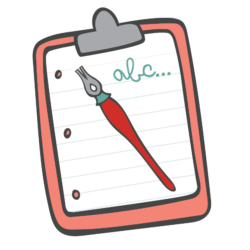 If you’ve seen her on Periscope or Instagram (@randomolive), you’ve likely experienced the zen of watching each letter loop onto the page in front of your eyes, & you’ve likely found yourself admiring her latest cute nail polish shade at the same time, because ROBIN’S EGG! I mean c’mon.
If you’ve seen her on Periscope or Instagram (@randomolive), you’ve likely experienced the zen of watching each letter loop onto the page in front of your eyes, & you’ve likely found yourself admiring her latest cute nail polish shade at the same time, because ROBIN’S EGG! I mean c’mon.
She’s super talented, but she wasn’t always.
Creating a consistent practice & giving herself space to be a beginner played a huge role in Olivia finding her style & embracing her expertise – & then building that expertise into a cool creative business that she loves.
Here’s what she has to say about practice:
Kris: Hey Olivia! I know you’re moving right now (Congrats! & thanks for taking the time to chat while your world is in boxes). You’re a super organized person, but is it tough for you to find space to practise your hand-lettering & free-writing during the move?
Random Olive: With my moving, there was really no time or supplies to practice lettering. I had to spend the hours before and after work packing, so not much time left to practice.
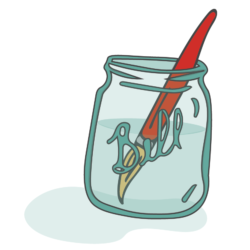 Also, I typically have a dedicated art table that needed to be cleaned off and packed up, so all my supplies were in boxes until I was settled enough to unpack them.
Also, I typically have a dedicated art table that needed to be cleaned off and packed up, so all my supplies were in boxes until I was settled enough to unpack them.
Kris: Gah! I can’t wait to hear about your new set-up after you’re settled in though; I’m sure you’ll get back into the swing of it quickly. How did you make practice a habit or routine in your life initially? What was the process like when you first started?
Random Olive: When I first started lettering, I would spend an hour or so after work to practice. It was that sweet spot of time after I got home from work, but before my husband got home from work, so I’d have a bit of quiet time to myself.
Scheduling the time was really important in making it a priority and building it into a routine.
Kris: That’s great advice! I find that scheduling it in is key too. What is another lesson you have learned about practising a skill that others might benefit from?
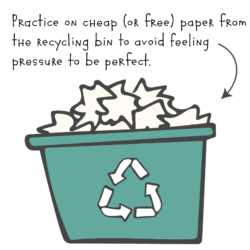
Random Olive: For me, knowing that my first drafts weren’t going to be seen by anyone was a huge benefit. I didn’t have to let my perfectionist brain kick in because I was purposely using inexpensive paper (scratch paper picked from the recycling bin at the office) that I knew I was going to recycle right away.
Enjoy the process more than the result at first and keep working at it. It’s especially helpful that brush lettering is a slow and zen process that I could do while watching YouTube videos.
Kris: I love that: “Enjoy the process more than the result.” You actually started practicing hand-lettering as a way to add more creativity into your life. What else has the actual practice added to your life?
Random Olive: Aside from being creative, practicing and continuing to work on my brush lettering helped show me that I really can learn and improve on any skill. It’s definitely not natural talent and it takes practice and trial and error to get better.
[clickToTweet tweet=”‘If I can practice my way to great looking lettering, what else can I possible achieve?’ @randomoliveblog” quote=”‘If I can practice my way to great looking lettering, what else can I possible achieve?’ ~ Random Olive”]
Kris: You practise daily free-writing as well as regular practice of your hand-lettering skills. What do those two practises have in common for you?
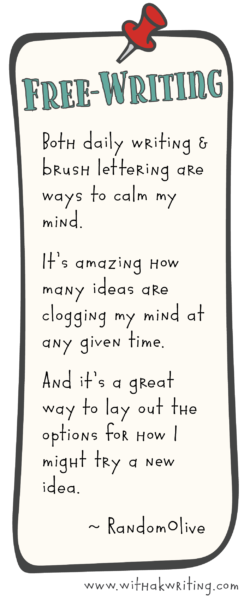 Random Olive: Both daily writing and brush lettering are ways to calm my mind. The writing is mostly a brain dump of all the ideas swirling around in my head to get it all out on paper, while the lettering is a way to slow down and focus in on one brush stroke at a time. They’re totally opposite in their execution and speed. The free-writing is messy and scrawled and fast. The brush lettering is slow and deliberate. But they both have the same effect of being my quiet time.
Random Olive: Both daily writing and brush lettering are ways to calm my mind. The writing is mostly a brain dump of all the ideas swirling around in my head to get it all out on paper, while the lettering is a way to slow down and focus in on one brush stroke at a time. They’re totally opposite in their execution and speed. The free-writing is messy and scrawled and fast. The brush lettering is slow and deliberate. But they both have the same effect of being my quiet time.
Kris: That’s an interesting way to look at the two types of writing. My free-writing is usually messy & slapdash too. It’s surprisingly fun to make a mess in my pretty notebooks. What is one benefit of specifically free-writing that you were surprised by?
Random Olive: It’s amazing how many ideas are clogging my mind at any given time. While my free-writing is usually a list of to-dos, sometimes I come up with great business ideas or art projects that I want to work on. And it’s also a great way to lay out all the options for how I might respond to a request or try a new idea.
Kris: I like that too; it’s a great place to explore…but I don’t always feel like it. When you really feel like just NOT doing the thing, what do you remember or do that helps you to pick up the pen & notebook or the brush & paper?
Random Olive: Just do one page…& usually that turns into more.
Kris: YES!!! That’s a great piece of advice. I like to set a timer to a short amount of time or give myself a super easy goal to start. Once you get going, it’s a lot easier to keep on.
Thanks so much, Olivia! I hope you get your new practice space set up soon, because I’m missing your videos, & I want to see the new digs!
If you want to check out RandomOlive’s awesome brush-lettering practice guide, you should! It’s a great way to get that brush-lettering practice in if you’re interested in learning how to make beautiful letters.
If you’re interested in trying out a free-writing practice, but you’re a little nervous about getting going, you can join the #30DaysWithaK free-writing challenge right now for free & start to find your Voice today.
xo
Kris
You mad? Excited? Have a perspective to share? Please do!
8 Comments
Leave a Comment
Want to read more? Check out these recent articles.
Before you hire a Website Designer…you need to do this!
I remember when I decided to first open up a website for my business & blog…. I couldn’t afford to hire a website designer, so I went to Creative Market & searched for days to find a theme that would work – without any real idea of what “work” even looked like. I finally bought one…
To Actually BE a Writer, you need to be doing these 3 things
I’ve always known that I wanted to be a writer. But I haven’t always known how to actually…well…BE a writer. I mean, I learned fairly early on how to write things: sentences, paragraphs, stories, poems…but that’s not what it takes to really be a writer. It’s a big piece of it, but it’s only a piece.…
Stop Trying to Find Your Voice. Try trusting it instead.
The most common bit of writing advice out there is to, “Find your Voice,” but how do you even do that? Surprisingly, you have to stop trying.
The Shocking Truth About Writer’s Block is Simple.
It’s that horrible feeling when you sit down to write, but instead of finding that creative flow pouring out – you sit paralyzed, staring at your computer screen & seething at the impossible task of…words. Everybody who’s tried communicating with words has felt it: a paralyzing barrier between the idea you want to share & the ability to…
Let’s play a little game of 20 Questions
A few weeks ago, I went on the trip of a lifetime. I didn’t go on rides at Disneyland or see a Broadway show in New York City, & I didn’t go to Scotland to search for a family castle either. I will someday though. Sup, Clan MacLeod! I went to San Francisco; it wasn’t my first…


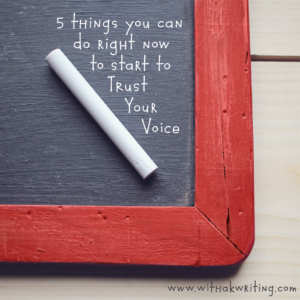
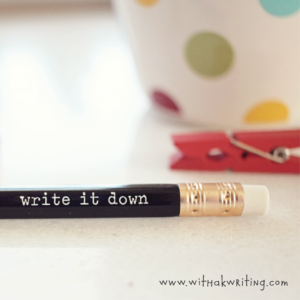
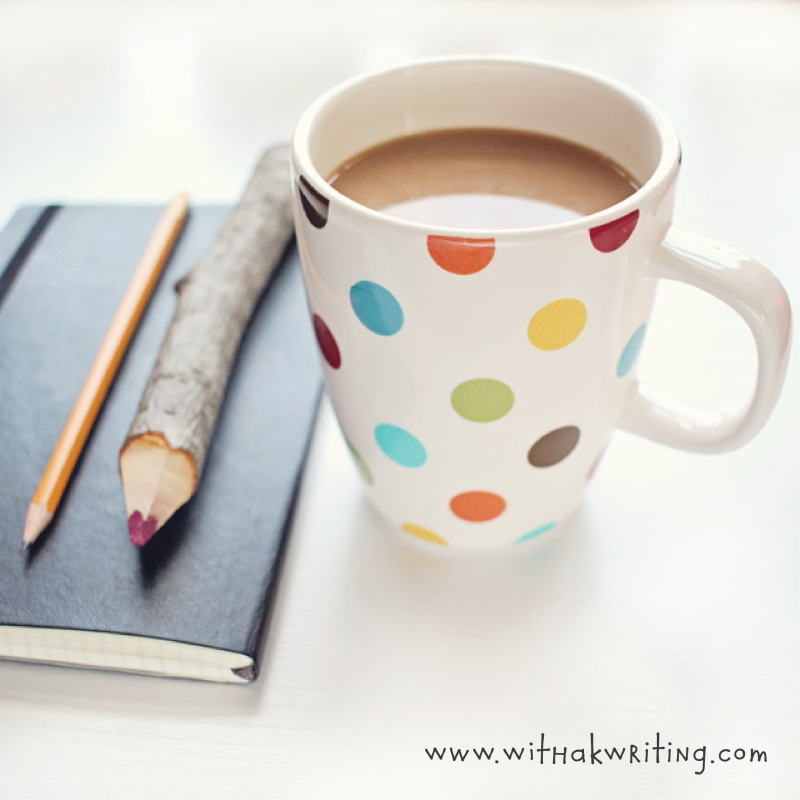
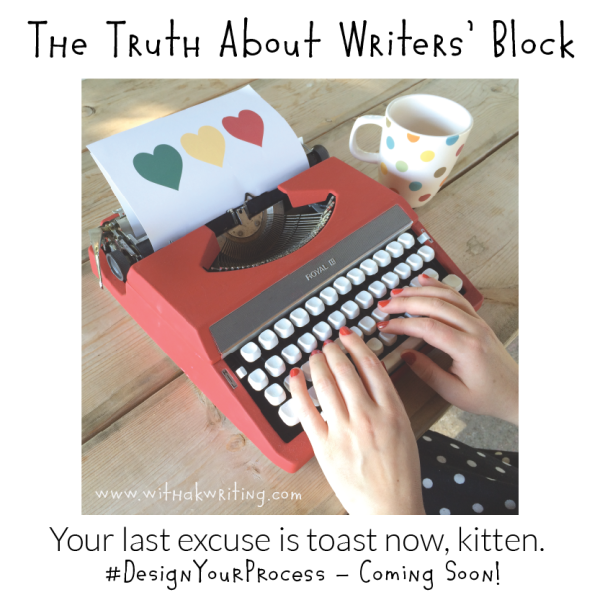
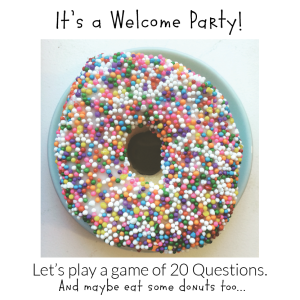
[…] Read this interview I did with a friend of mine about the joys and importance of practice: Enjoy the practice and embrace your beginning. […]
[…] Pop over to With a K Writing for a fantastic interview with Olivia about her brush lettering […]
[…] 5. Kris interviews Random Olive and shares a tip on brush lettering practice. […]
What a great tip about scrap paper! I have a stack of misprints that I have felt guilty to toss or recycle yet, but haven’t found a good use for (besides the odd scribble.) I just put a stack through to print the ABC’s from Olivia’s letter guide and am loving the idea of the low pressure of practicing on scrap paper. 🙂
I love it too, Sarah.
And I think I’m going to use it more too. I’ve made a little bin for brush lettering paper at my house, to collect no-pressure paper for when I jump in & begin Olivia’s guide this summer.
xo
K
[…] I’ve said it before, & I’ll say it again: you need to put in the hours & practice writing every day. That’s the only way to find your own style & develop it. It’s the only way to find & target your weak spots & turn them into strengths, & it’s the only way to get comfortable putting one word in front of the other – again & again & again – until you find your voice. […]
What a great interview!!! Two of my favorite people together in one post. It’s like peanut butter and chocolate, but in written form.
So much of what you describe is also relevant to knitting. Really any hobby or creative endeavor requires time and practice, doesn’t it? Music, languages, cooking, whatever! To get good at anything, the bottom line is it’s going to take some time and effort. But that’s the fun part, right? The DOING of the thing.
You’re right about being willing to make a mess first, because that’s how we learn.
Thanks Patty!
It’s always fun chatting with one of the Creative Live ladies, so I enjoyed it too 🙂
And you are totally right about the mess: it’s the fun part. When you embrace & enjoy that learning part of the process on purpose, every single thing gets better.
xo
K